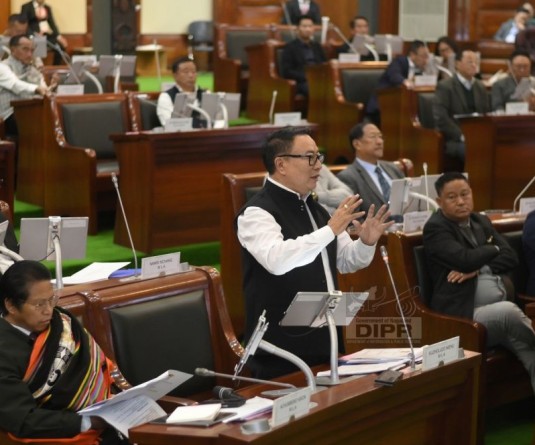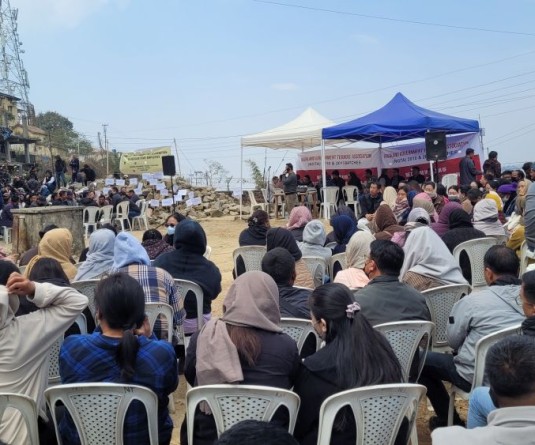
National seminar on challenges of tribals concludes
DIMAPUR, MARCH 25 (MExN): The UGC National Seminar at Tetso College on ‘The Challenges and issues of the Tribal of India’ concluded today, with paper presentations by Limongi Khuvung, Asst Professor, Department of Political Science, C-Edge College, Dimapur; Dr Rukulu Kezo, Asst Professor, Modern College, Kohima and Namsurei Thomas Kamei, Asst Professor, Department of Economics, Tetso College.
A press note from the organizers informed that Dr. Rukulu Kezo presented the paper ‘Deconstructing the misrepresentations of the Naga Identity: Reclaiming the rich cultural heritage,’ which was also written by Vivonu Sothu, Asst Professor, Modern College, Kohima and Metseilhouthie Mor, Research Scholar, Nagaland University.
It observed there are misconceptions that Naga society was not organized and that the Nagas were savages. This popular misconception is no doubt a result of Christianity which painted the Naga way of life as ‘sin’, the paper said.
“However, contrary to the misconceptions, a thorough study of the Naga’s lost past afforded through the oral traditions reveals that the Naga society was in fact well organized. There existed strong value systems that governed the lives of the people at the individual level as well as the community level,” it added.
The paper attempted at reconstructing the lost past of the Nagas while seeking to present the view that the Naga’s old way of life was organized and harmonious. The paper specifically discussed how ‘Kenyü’ (forbidden or taboo) served as a kind of law in governing the lives of the people in the context of Tenyimia. It also explored how Christianity brought about a major upheaval in the structure and understanding of the Naga ethnic identity.
Khuvung in his paper titled ‘The Demand for Separate ‘Bodoland’: Issues and Concerns,’ noted how India has experienced numerous challenges from various ethnic groups posing serious challenge to the state.
His study focused on the Bodo demand for a separate homeland called ‘Bodoland’ and traced the history of the Bodo movement, which initially started as a movement for assertion of Bodo language. He focused on the different stages of the Bodo movement to examine how the demands of the movement change as the movement moves through different stages.
While examining the different stages, the study stressed on two main concerns that remains as a stumbling block for realizing the Bodos dream for separate Bodoland. First, the internal conflict within the Bodo movement that continues to weaken the movement, and the confrontation posed by other plain tribals and non- tribals for the creation of ‘Bodoland’ in the proposed Bodoland areas Namsurei Thomas Kamei meanwhile presented a paper titled ‘The Economics of Gender Discrimination and Human Development,’ which examined the loss in potential Human development due to gender discrimination through comparisons of quantifiable parameters for both male and female in India and Nagaland.
“The pace of enhancing human productivity is reduced when there is gender discrimination in terms of inequality in the availability of opportunities.
Gender inequality remains a major hurdle to human development,” it observed. The paper noted that too often, women and girls are discriminated against in health, education, political representation, labour market, etc — with negative repercussions for development of their capabilities and their freedom of choice.
The panel discussion hour meanwhile witnessed conversations on problems in the State of Nagaland ranging from the problems of tribalism and identity to inferiority complex, role of Church in state legislation, language as a tool for empowerment and skirted upon the recent crisis pertaining to the ULB elections and individual rights.
The panelists were Dr Samuel Wati, Asst Professor, NIT Chumukedima; Vitono Gugu Haralu, Founder & Director, Pathfinders and Yi Member and Loina Shohe, Ph.D Scholar, Nagaland University, Lumami. The moderator for the session was Yanbeni Yanthan, Asst Professor, (English), Centre for Naga Tribal Language Studies, School of Humanities& Education, NU.
The discussion brought about different perspectives on the question of the extent of involvement the church and religion should have in State legislation, while reflecting on the influence it already has like the imposition of a dry state in Nagaland as well as the platform or space Churches provide to advocate certain causes for political or social bodies.
On the question of Naga identity, it was agreed that the transition from tradition to modernity needs to be carefully assimilated to prevent a confusion of Naga identity.
The panel also discussed on the need to adopt “open-mindedness” and remove the “fear” of speaking out and participation of students and individuals amongst the Naga community. It elicited further debate on whether it comes from the age old tradition of silence as respect for elders or from colonial domination that advocated the need to civilise the “savage” creating a sense of inferiority.
The discussion also touched on the issue of language barrier as one of the causes for alienation and inhibition in a country or community whether it is a national/international language or a tribal language or dialect.
Concluding on the note of identity, the panellists agreed that identity is a collection of all the good values given by one’s family or community.






